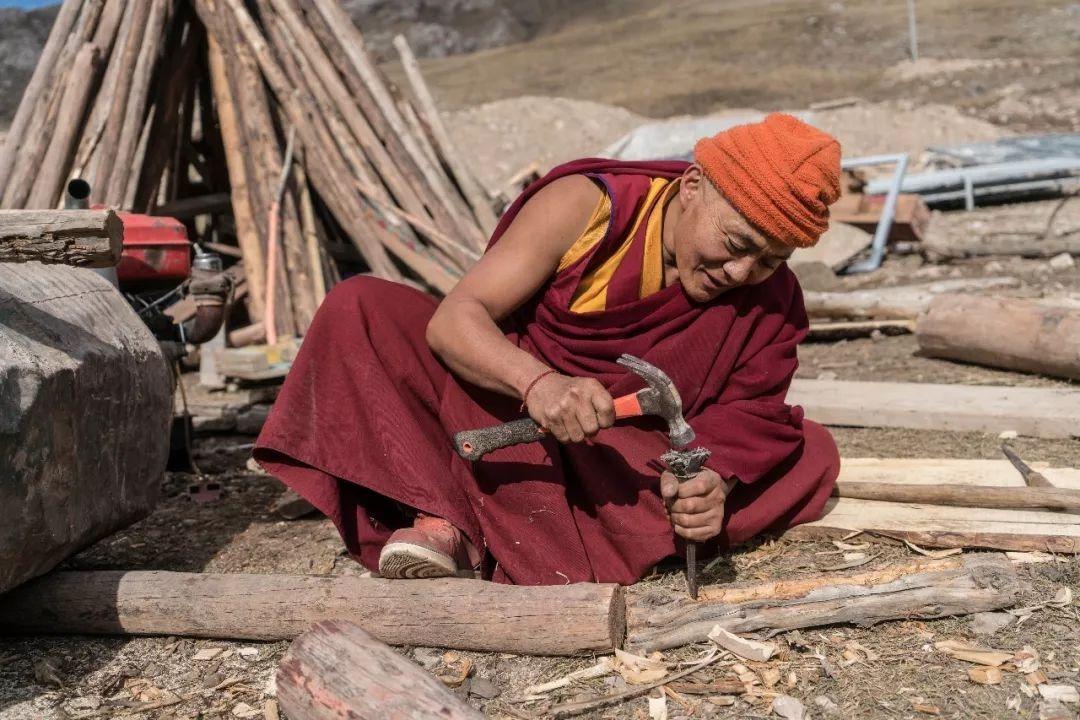A rising generation in China actively integrates sustainability into daily life, highlighting a collective commitment to environmental protection, societal well-being, and a greener future, Wang Yuting reports.
 Interior view of the first zero-waste environmental center on the Qinghai-Tibet Plateau, showcasing furniture and decor sourced from secondhand items and traditional artifacts brought in by local villagers. (PHOTO PROVIDED TO CHINA DAILY)
Interior view of the first zero-waste environmental center on the Qinghai-Tibet Plateau, showcasing furniture and decor sourced from secondhand items and traditional artifacts brought in by local villagers. (PHOTO PROVIDED TO CHINA DAILY)
Wu Yuxi, a 29-year-old professional in the financial investment industry, has been renting a home in Shanghai for years. But she has rarely purchased any furniture — wardrobes, tables, and even smaller items like lamps and figurines — since she has either found or received them as secondhand treasures.
"For me, these old items aren't waste. They've just been misplaced," Wu said. "Imagine giving them new life through cleaning, repairing, and transforming. Wouldn't that make life more beautiful?"
Wu's approach aligns with the shifting mindset of many young people in China, actively integrating sustainability principles into their lifestyles. Through concrete actions, they raise awareness about environmental protection, refine technologies, and strive for a balance between economic prosperity and the societal well-being.
"For the younger generation, there's no single fashionable way of living. The pleasure and sense of achievement from consumption can also be derived through the recycling of old items," Wu said. "Whether at a personal level — reducing life expenses and emotional stress — or at a societal level, practicing low-carbon and environmentally friendly behaviors, it's all positive."
For example, when Wu entered university, she wanted a sketchpad but didn't have the money to buy a brand-new one. She found a nearly new one at a low price in the school's flea market, previously unused by her seniors. This tablet has become Wu's companion for a decade, sparking her interest in recycling old items.
As a design graduate, Wu discovers that using refurbished items not only saves money but also brings a sense of accomplishment and joy.
Sustainable influencers
Chen Jiaorong, a 27-year-old internet influencer, first learned about the concept of "stooping" from overseas video bloggers — a concept that involves picking up discarded items, refurbishing, and repurposing them.
Chen was among the first to introduce this concept within the Chinese social media sphere, and for her, this behavior brought additional value to life far beyond people's imagination.
Stooping enhances my observation of surrounding things and effectively alleviates my internal struggles.
Chen Jiaorong, 27, an internet influencer
"Stooping enhances my observation of surrounding things and effectively alleviates my internal struggles," Chen explained. "This behavior makes me realize that even without enough resources, I can gradually achieve my goals through picking up and collecting."
Currently, Chen operates a social media account with approximately 50,000 followers dedicated to stooping and the recycling of old items.
With participation from thousands of people, according to Chen, active communities related to these topics are causing an increasing number of people to pay attention to the circular economy and sustainable living.
Su Yige, 25, one of the first Chinese video bloggers to share a sustainable lifestyle, provides her take on the overarching theme of environmental protection: "Leave the least trace on Earth and as many stories as possible."
During her university years, Su stumbled upon an image of a small glass jar filled with trash, representing eight years of waste generated while practicing a zero-waste lifestyle.
Raised in a frugal and environmentally conscious family, Su quickly developed an interest in zero-waste living and committed to it for three years.
However, whether crafting her own cleaning products or composting kitchen waste, this lifestyle, which generates minimal garbage, has proved immensely challenging and caused Su considerable anxiety and distress.
"We don't need a handful of people doing zero waste perfectly. We need millions of people doing it imperfectly." This statement by Anne Marie Bonneau, a well-known Canadian zero-waste blogger, prompted Su to shift away from ascetic environmental practices and seek sustainable living solutions that ordinary people can adopt, maintain, and find joy in.
Loving oneself and loving the Earth are not mutually exclusive in most cases.
Su Yige, 25, a video blogger
Through extensive learning, contemplation, and practical experience in environmental knowledge, Su introduced the concept of "traceless" living. The idea is to enjoy life while leaving as little trace as possible, aiming to be users of Earth's resources rather than plunderers.
"Loving oneself and loving the Earth are not mutually exclusive in most cases," Su said.
Her concept of traceless living found realization in Jianzuo village in Nangqen county, Yushu Tibetan autonomous prefecture, Northwest China's Qinghai province.
With invaluable natural landscapes and biodiversity, the village is located in the source area of the mighty Lancang-Mekong River. This region is one of the most sensitive globally regarding climate change.
Realizing that casually discarding garbage was threatening the natural environment and wildlife in the Lancang River source area, Jamyang Sherab, a local Buddhist scholar, organized villagers in April 2016 to establish the Dejia Environmental Protection School. The goal was to guide herders to return to a healthier lifestyle.
Under the guidance of three goals — zero waste, altruism, and organic food — the herders gradually eliminated the use of plastic and disposable items, consumed only locally produced organic food, and successfully established the first truly zero-waste community on the plateau after a year of effort.
Pachuk Tsering, a 26-year-old Tibetan, ventured out of Jianzuo village to pursue higher education and, upon graduating, chose to return to his hometown as the project leader for the Dejia Zero-waste Community. His primary responsibilities include monitoring water sources, wildlife, and phenological phenomena, as well as providing explanations to tourists.
Working alongside Pachuk are numerous young volunteers from across the country. "I'm delighted by the sincerity and environmental awareness of today's youth. They provide me with great motivation," he said. "In this fast-paced era, environmental work is much like spiritual practice, cultivating not only the natural environment but also one's character and inner self."
Regarding the future development of the community, Pachuk aspires to explore business conversion points within environmental protection, such as developing eco-friendly products and enhancing ecological tourism experiences. These initiatives aim to create a stable source of income for the community, fostering sustainable development.
 A member of the Dejia Environmental Protection School crafts flower pots and incense holders using leftover wood. (PHOTO PROVIDED TO CHINA DAILY)
A member of the Dejia Environmental Protection School crafts flower pots and incense holders using leftover wood. (PHOTO PROVIDED TO CHINA DAILY)
Youth climate action
In addition to adopting environmentally friendly lifestyles, what else can China's Generation Z do for sustainable development and environmental protection? Wen Yi, 20, a junior student at Hunan Normal University's School of Education Sciences, has an answer.
According to Wen, educating teenagers about climate change and fostering their awareness of sustainable development are the cornerstones of global efforts to address environmental issues.
I encourage more youth to join in raising environmental awareness and contribute to our carbon goals.
Wen Yi, 20, a student at Hunan Normal University
Leveraging her expertise as an education major, Wen established the Environmental Protection Squad at the university last year. She also initiated Youth Low-Carbon Activity Day, organizing a variety of fun and informative environmental activities to educate teenagers on the scientific principles of waste sorting and encourage their participation in actions ranging from plastic reduction to sustainable design.
Wen's activity planning was selected for the 2022 China Eco Design Talent Grant Program, a cultural charity venture initiative hosted by the Beijing Contemporary Art Foundation (BCAF).
Thanks to this program, many young designers have garnered public attention, contributing additional possibilities for China's sustainable development.
"I encourage more youth to join in raising environmental awareness and contribute to our carbon goals," Wen said.
Cui Qiao, chairman of BCAF, explained that as a nonprofit public art foundation, BCAF has been dedicated to expanding public perspectives through artistic philanthropy, which benefits both public interests and industry dialogues.
Since 2019, the foundation has included sustainable design as one of its strategic areas, providing financial support and an extensive platform for communication and exhibition to young Chinese designers. The goal is to make the public aware of the close connection between sustainable environmental protection and individual lives.
"Chinese youth possess an active observation and exploration of society, coupled with strong individual creativity," Cui said. "I hope our young generation can freely experiment, explore the world around them, and listen to the practical needs within environmental communities. Through their actions, they can contribute to creating a greener future."
Eco-business shift
How to turn environmental solutions into the top choice for businesses through strategic planning and technological innovation? This is a question currently being pondered by many social enterprises and young talents in China.
Wang Fayou, a 34-year-old graduate from East China University of Science and Technology, developed an interest in environmental protection during his university years through an internship experience teaching elementary students about eco-friendly themes.
During his first job in the textile and apparel industry after graduation, Wang learned for the first time that recycled plastic bottles and textiles could be transformed into yarn applications.
The demand from numerous foreign clothing brand clients for the use of recycled yarn sparked his desire to engage in sustainable materials work.
In 2021, Wang joined Goodcycle Environment Technologies, a Chinese environmental startup established in 2017, to delve into the research and development of new recycled materials and products.
Similar to Wang, Wu Liqi, one of the co-founders of Goodcycle, developed a belief in entrepreneurial aspirations for the environmental industry during her work in related fields when she saw many ways to make traditional business more environmentally friendly. But it wasn't her place as an employee to initiate the change so she decided to start her own business and be the solution herself.
"The more business I make, the more bottles I save. To me, that's a perfect business model," she said.
Goodcycle has established the "Recycle-Traceability-R&D" recycled polyester industrial chain, transforming discarded plastics into well-designed, high-quality products through technological innovation.
"The research and development cycle for new recycled materials is lengthy, and the process is extremely intricate. However, the significance of our efforts lies in replacing virgin materials with recycled ones, reducing carbon emissions and contributing to the improvement of the Earth's environment," said Wang.
To help consumers better identify the source of waste and improve environmental awareness, Goodcycle also includes detailed information on each recycled product's label, specifying the material, its composition percentage, and its volume in terms of a lifestyle product. For instance, their recycled polyester sports T-shirts are crafted entirely from PET plastic bottles, while their recycled mugs are composed of 30 percent Americano coffee grounds.
"Despite the environmental challenges presented by technological development, it also holds the potential to create more advanced environmental solutions," Wang said. He added that, with the maturation of environmental awareness and human ingenuity, a harmonious balance between technology and environmental protection can be ultimately achieved.
Contact the writer at wangyuting@i21st.cn


